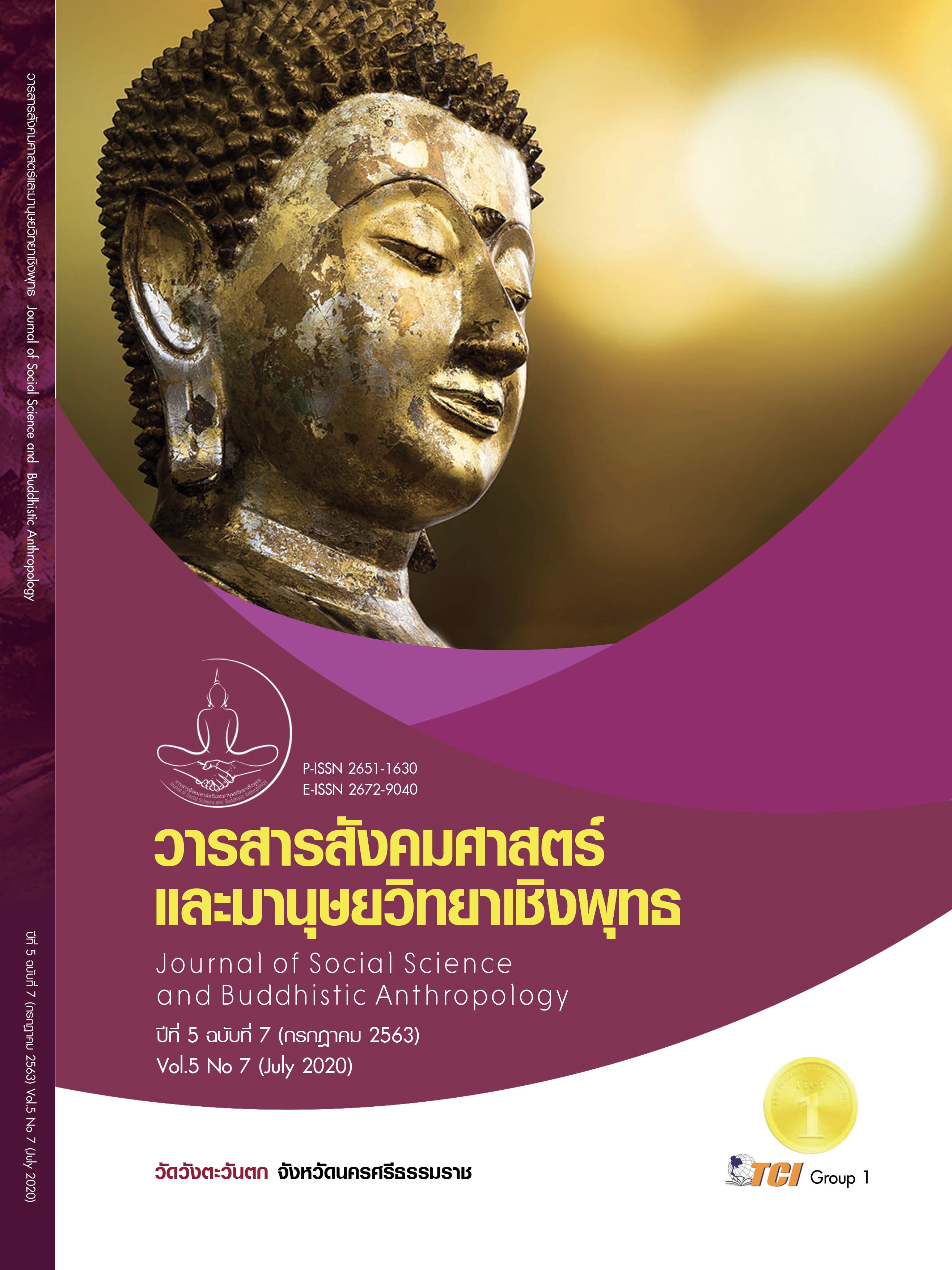ADMINISTRATIVE FACTORS SUPPORT THE PERSISTENCE OF BUDDHISM IN THAILAND
Keywords:
Administrative Factors, Support The Persistence, Buddhism in ThailandAbstract
The objectives of this article were to 1) study the persistence of Buddhism in Thailand 2) study the administrative factors that support the persistence of Buddhism in Thailand 3) propose ways to support the persistence of Buddhism in Thailand able to amend the sangha law by documentary research and using content analysis techniques. The data obtained from the study of 69Thai-language literature, including 23 of them being electronic media websites, 41 English language literature. Analyzed under the concept of management factors ; Buddhist temple management, sangha administration and the roles and duties of the Buddhist company in relation to the persistence of Buddhism in Thailand.The results of the research were as follows: 1)the persistence of Buddhism in Thailand is condensed by the principles of Buddhism and traditional beliefs in Brahmanism to develop into a Thai culture that is in the forms of tradition 2) administrative factors that support the persistence of Buddhism in Thailand In the management of Buddhist temples depends on the abbot of the temple to integrate the administrative principles with the dharma principles,in the administration of the Sangha in the Sangha activities, by following to the dharma discipline , following to specific laws regarding national administration and the Sangha Act does not comply with the social conditions,regarding the roles and duties of the Buddhists with the study of the dharma discipline to see clearly before propagation,nowadays, the propagation as a defense, instead of pilgrimage.The deterioration of Buddhism is caused by the majority of Buddhist companies do not understand the principles of Buddhism. and 3)approaches that support the persistence of Buddhism in Thailand should be amendments to the Sangha Act in issues that are not consistent with social conditions.
References
กนกวรรณ สุทธิพร. (2557). การดำรงอยู่ของพระพุทธศาสนาแบบจารีตในประเทศญี่ปุ่น กรณีศึกษานิกายฌิงงน แห่งหุบเขาโคยะ. ใน ดุษฎีนิพนธ์ปรัชญาดุษฎีนิพนธ์ สาขาวิชาสหวิทยาการ. มหาวิทยาลัยธรรมศาสตร์.
ใจ บุญชัยมิ่ง. (2555). เปรียบเทียบกลวิธีการเผยแผ่คำสอนของพระพุทธศาสนากับศาสนาคริสต์ในเขตภาคเหนือ. ใน รายงานการวิจัย. มหาวิทยาลัยมหาจุฬาลงกรณราชวิทยาลัย วิทยาเขตพะเยา.
พระเทพปริยัติเมธี (สฤษฏ์ สิริธโร). (2557). เอกสารคำสอนรายวิชานโยบายสาธารณะและการวางแผน. กรุงเทพมหานคร: โรงพิมพ์มหาจุฬาลงกรณราชวิทยาลัย.
พระเทพเวที (ป.อ. ปยุตโต). (2536). พุทธศาสนากับสังคมไทย. (พิมพ์ครั้งที่ 2). กรุงเทพมหานคร: มูลนิธิกลมคีมทอง.
พระธรรมปิฎก (ป.อ. ปยุตฺโต). (2555). ความสำคัญของพระพุทธศาสนา ในฐานะศาสนาประจำชาติ. นครปฐม: โรงพิมพ์บริษัทสหธรรมิก.
ภัทรพร สิริกาญจน. (2557). พระพุทธศาสนาในประเทศไทย: เอกภาพในความหลากหลาย. กรุงเทพมหานคร: มหาวิทยาลัยธรรมศาสตร์.
มหาจุฬาลงกรณราชวิทยาลัย. (2539). พระไตรปิฎกภาษาไทย ฉบับมหาจุฬาลงกรณราชวิทยาลัย. กรุงเทพมหานคร: โรงพิมพ์มหาจุฬาลงกรณราชวิทยาลัย.
วัน สุวรรณพงษ์ เเละคณะ. (2560). แนวทางการบัญญัติข้อกฎหมายเพื่อคุ้มครองพระพุทธศาสนา. วารสารวิชาการธรรมทรรศน์, 17(3), 17-24.
สำนักงานพระพุทธศาสนาแห่งชาติ. (2563). ประวัติพระพุทธศาสนาในประเทศไทย. เรียกใช้เมื่อ 8 กุมภาพันธ์ 2563 จาก http://atc.onab.go.th/index.php? option=com _content&view=article&id=396:2010-03-05-08-44-35&catid=46:2008-10-29-14-43-09&Itemid=80
สำนักงานสถิติแห่งชาติ. (2561). สำนักงานสถิติฯ เผยผลสำรวจ สภาวะทางสังคม วัฒนธรรม และสุขภาพจิต ปี 2561. เรียกใช้เมื่อ 8 กุมภาพันธ์ 2563 จาก http://www.nso.go. th/sites/2014/ Pages/ News/2561/N21-09-61-1.aspx
Kinichi, A. & Kreitner, R. (2003). Organizational Behavior, (5th ed). IL: McGraw-Hill.
Robbins, S. et al. (2006). Management, (4th ed.). Australia: Pearson Education Australia.
Scott, J. (1990). A Matter of Record, Documentary Sources in Social Research. Cambridge: Policy Press.
Wellington, J. (2000). Education Research : Contemporary Issues and Practical Approaches. London: Continuum.
Wendell L. F. et al. (1990). Organizational Development: Behavioral Science Interventions for Organization Improvement. (4th ed.). New Jersey: Prentice Hal.









